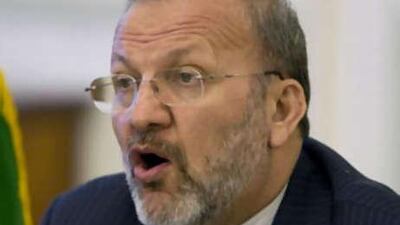NEW YORK // Iran's top diplomat predicted that the United States and Israel would not risk the "craziness" of attacking his country and possibly provoking a wider Middle East war or driving oil prices into uncharted heights. Manouchehr Mottaki, Iran's foreign minister said in an interview yesterday that he does not believe a military strike is looming while the US economy is suffering and it is bogged down in a seven-year-old campaign in Afghanistan and more than five years in Iraq.
His remarks come amid mounting speculation that Israel may be considering a unilateral strike on Iran's nuclear facilities - a contingency that could upend already volatile oil markets. "We do not foresee such a possibility at the moment. The Israeli government is facing a political breakdown within itself and within the region, so we do not foresee such a possibility for that regime to resort to such craziness," Mr Mottaki said. "The United States, too, is not in a position where it can engage in, take another risk in the region. Of course, there are people in the United States who are interested in that. "But we think that the rational thinkers in the United States will prevent from that action being taken, and will prevent the imposition of another adventuresome act that would put pressure on the American taxpayers."
US president, George W Bush, and others in Washington made it clear yesterday that all options are on the table with regard to Iran and its nuclear program, but a military strike would not be Mr Bush's first choice in the waning months of his presidency. There have been growing worries that the conflict between Iran and the West over the nuclear issue could broaden into a more violent conflict, particularly if Israel tried to attack Iran's nuclear facilities in Natanz. The five permanent members of the UN Security Council - the US, Britain, France, China and Russia - as well as Germany have offered new talks if Iran signals it is prepared to suspend its enrichment of uranium.
Although Iran prefers the diplomatic route, Mr Mottaki said, he pointedly did not rule out trying to restrict oil traffic in the strategic Strait of Hormuz if Iran was attacked. "In Iran, we must defend our national security, our country and our revolutionary system and we will continue to do so," he said. If his country was ever targeted militarily, he added, "politicians must step aside a bit and allow the military to make decisions."
But in the interview, conducted at AP's world headquarters in New York, Mr Mottaki also signaled that a dialogue remains open to resolve the impasse and indicated Iran is seriously considering the offer of new talks. "We see and have observed some improvement in the US position," he said. He was not the only one apparently seeking to defuse tensions. "I have made it very clear to all parties that the first option ought to be solve this problem diplomatically," Mr Bush said. "And the best way to solve it diplomatically is for the United States to work with other nations to send a focused message - and that is, you will be isolated, and you will have economic hardship if you continue to enrich."
At a Defense Department news conference, Adm Mike Mullen, chairman of the Joint Chiefs of Staff, said an Israeli strike on Iranian nuclear facilities would be a high-risk move that could destabilize the Middle East. Adm Mullen would not say, however, what Israeli leaders told him during meetings last week about any intentions to strike Iran. "This is a very unstable part of the world and I don't need it to be more unstable," he said. "Opening up a third front right now would be extremely stressful on us." He said that Iran would not have the ability to sustain a blockade of ship traffic in the Strait of Hormuz.
Mr Mottaki, who was in New York for talks at the United Nations, hinted there has been diplomatic progress on easing tensions with the West. He struck a conciliatory tone toward the United States and said he sees improvements in the US tone recently as well as in some recent diplomatic offerings to Iran. *AP

